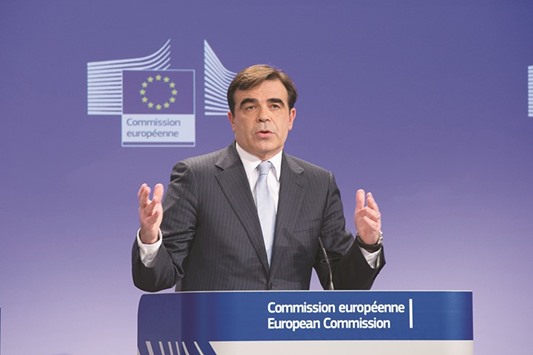The European Commission yesterday insisted talks on a huge US free trade agreement were on track, rejecting German claims that irreconcilable differences had left the deal dead in the water.
“The ball is rolling right now. The Commission is making steady progress,” Commission spokesman Margaritis Schinas said when asked about comments by German Vice-Chancellor and Economy Minister Sigmar Gabriel that the talks had “failed”.
“Talks are now indeed entering a crucial stage but... provided the conditions are right, the Commission stands ready to close this deal by the end of the year,” Schinas told a regular press briefing.
The EU and US began work on the Transatlantic Trade and Investment Partnership (TTIP) in 2013, aiming to create the world’s largest free trade area by the time President Barack Obama leaves office in January next year.
But the talks have got bogged down amid widespread suspicion in the 28-nation EU that a deal would undercut the bloc’s standards in key areas such as health and welfare.
As the US presidential vote nears and with the French and Germans heading to the polls in 2017, Gabriel is only the latest high-ranking European to cast doubt on a swift deal.
France’s Prime Minister Manuel Valls has said it would be “impossible” for the two sides to conclude negotiations on a trade deal by the end of 2016.
On Sunday, the vice-chancellor told German television that “the talks with the US have de facto failed because we Europeans of course must not succumb to American demands... Nothing is moving forward.”
Germany’s governing left-right coalition is divided over TTIP.
The centre-left Social Democratic Party (SPD) led by Gabriel is increasingly sceptical, while Chancellor Angela Merkel and her conservative Christian Democratic Union (CDU) remain largely in favour.
Gabriel is “dancing on eggshells between his roles as Social Democratic Party leader and economy minister,” CDU general secretary Peter Tauber said yesterday.
Industry groups also repudiated the SPD leader’s words.
“TTIP can’t be sacrificed to the election campaign that’s beginning,” said Matthias Wissmann, head of the powerful German Automotive Industry Association. Merkel’s spokesman Steffen Seibert confirmed the chancellor’s continued support for a deal, telling a Berlin press conference that “it’s right to keep negotiating”. Keen to disarm TTIP as an electoral weapon, the Commission, the EU’s executive arm which conducts all bloc trade negotiations, said a deal would not come at any cost.
Commission President Jean-Claude Juncker has made clear “the Commission will not sacrifice Europe’s social health and its data protection standards, nor its cultural diversity on the altar of free trade,” spokesman Schinas said.
Asked whether TTIP could go through without support from Germany, the EU’s paymaster and largest economy, he said Juncker had won fresh backing for the negotiations from all bloc leaders at a summit in July. “At the last (summit), precisely because we were entering this difficult and complex stage, President Juncker addressed his counterparts, checking whether there was political backing to conclude the deal by the end of the year,” Schinas said.
“We did not feel that there was a lack of support... we received the mandate to conclude these negotiations.”

The European Commission stands ready to close a free trade deal with the US by the end of the year, provided the conditions are right, says spokesman Margaritis Schinas.
